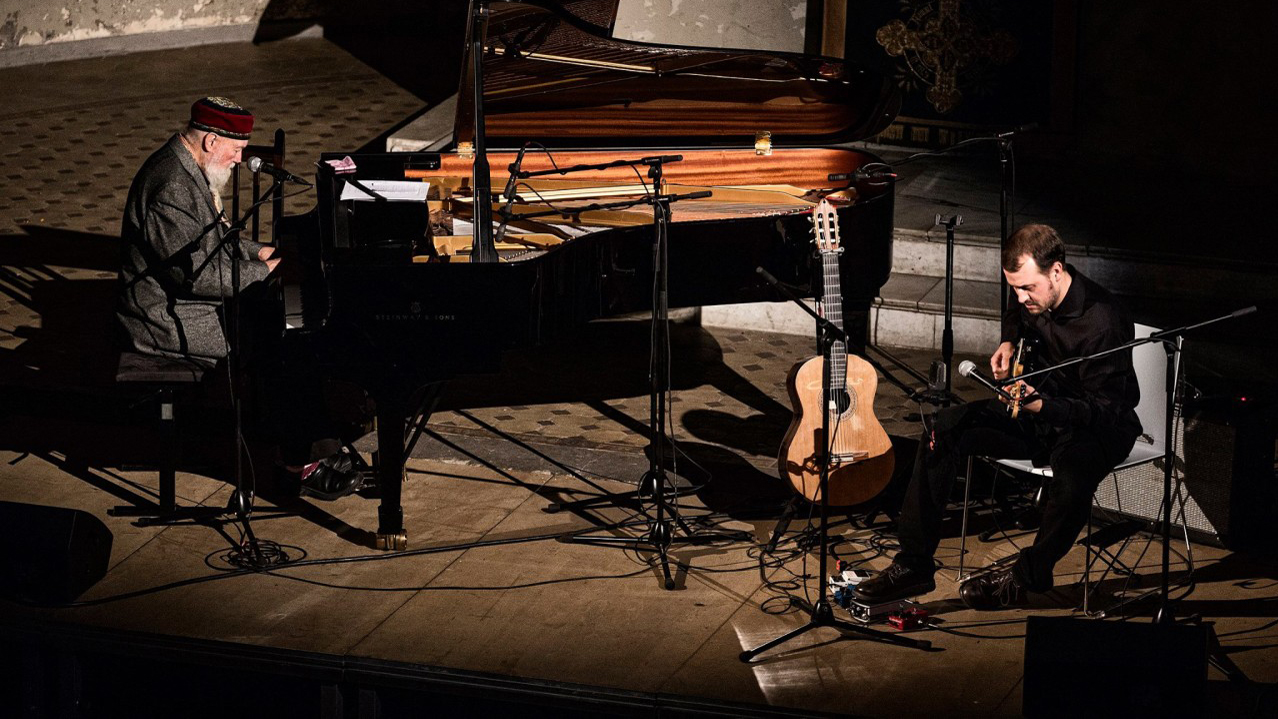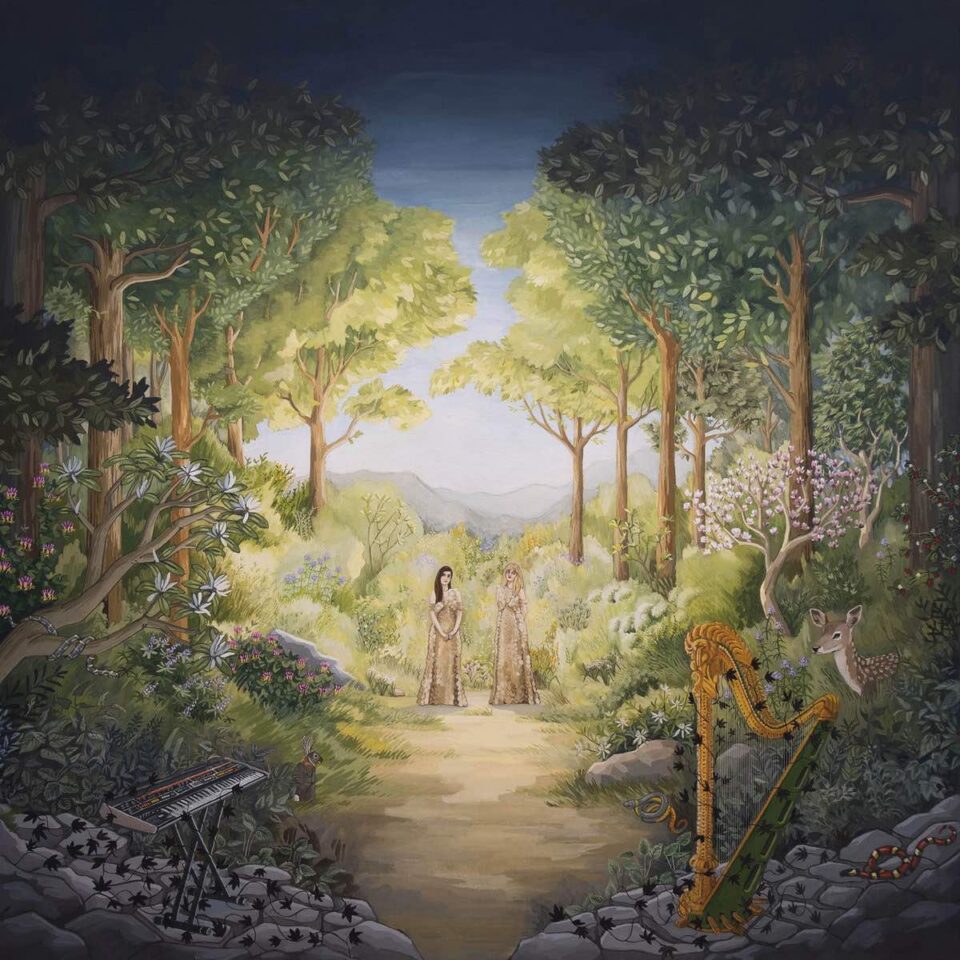Sometimes, it seems like roughly 97 percent of all music exists primarily as a rebellion against the values of one’s parents. Hell, considering the way many American parents voted in the last election, that rebellion is probably largely warranted these days. Still, it’s refreshing to see the rare familial collaboration that actually works—the sort which serves to expand understanding between generations.
Terry and Gyan Riley are a prime example of this. Terry, of course, is one of the cornerstone composers of modern minimalism, a vital link between classical academia and open-air psychedelia for the past fifty-plus years; his son Gyan is a classically trained—though deeply open and exploratory—guitarist who’s played with the likes of John Zorn and the Kronos Quartet (for whom Terry is a frequent composer). Their work together reflects Terry’s lifetime spent expanding the borders of his chosen framework, but with Gyan’s aid it also gets pulled into directions neither would be likely to take on their own. Together, the two spiral into marathon improvisations, largely acoustic, which dazzle and mesmerize.
In October, attendees of the Desert Daze festival in Joshua Tree, California, will be treated to some of those improvisations, which are sure to prove a welcome piece of that fest’s mind-expanding puzzle. FLOOD recently got both the elder and younger Riley on the phone to talk about the festival, the influence of LSD on early minimalism, the recent eclipse, and plenty besides.
Desert Daze is quite adventurous as festivals go, but it’s still largely rock/pop-oriented. It’s my understanding that your performance together will be improvised. Is that a daunting proposal in the face of a festival crowd?
Terry Riley: Well, that wouldn’t be much of an issue for me. I’ve played for lots of audiences, and I’ve played rock festivals before. We played together at All Tomorrow’s Parties a couple years ago. It’s kind of fun to be in front of people who don’t ordinarily hear us.
Gyan Riley: Also, rock and pop festivals can be somewhat inundating. You end up getting a lot of the same kinds of performances. So, my experience with those kinds of festivals is that, when you see something that is more adventurous or experimental, it’s really refreshing to go into that space for a while and get out of the four-minute song pattern.
TR: Also, it’s a different experience sonically than most rock groups. It’s good for people’s ears to have to focus on a different kind of sound texture.
GR: Being a duo, we can get into subtle and intricate textures that are much harder to do in a rock band construct. There’s so much more sound moving around [with rock bands].
That actually segues nicely into my next question: Improvisation is as much about listening as it is about playing, if not more so. Are there contexts where you find the listening becomes exceptionally challenging? If so, do you have a practice for re-centering your attention?
TR: For me, the challenge only comes when we’re having strange sound issues, with the monitors or whatever. If we have a good sound system and everything, I don’t think there’s an issue. We’re so used to playing with each other, we can usually find the music.
GR: Right, and the improvisational nature of what we do demands that we’re always in that sort of listening mindset… We can’t ever really go out of it! A big part of that is also based on whatever energy we’re getting from the audience, the space, the acoustics, and the overall experience. That can all have a big impact, and it affects how we respond.
John Cale is also playing Desert Daze this year. Terry, do you have any plans to rekindle the collaboration you explored with him on the Church of Anthrax album?
TR: That is very unlikely to happen. We did try to do something about twenty-five years ago. I flew to New York and had some meetings with John, but we finally gave up on the idea of trying to do another one. I think the first one was enough. [Laughs.]
Speaking of famous avant garde Johns: Gyan, you recently performed on an album of John Zorn compositions entitled Midsummer Moons, wherein the pieces are all, of course, lunar-themed. How did you spend the eclipse?
GR: Well, I was in New York City, so we had only a partial view here. I had a much less memorable experience than my dad did [Ed. Note: Terry watched the eclipse from within the path of totality in Corvallis, Oregon, about eighty-five miles south of this writer’s home base in Portland]. I just ran up about ten minutes before the apex and borrowed some glasses from a neighbor. I was able to look at it for awhile, but I guess I’m really just looking forward to the 2024 Northeast viewing! I was fortunate enough to see a total solar eclipse in Germany in 1999 or 2000, and I’ll never forget that. That was a very mind-bending experience, very powerful. I wonder if sales of that album spiked during the eclipse…
I deeply regret not driving the extra hour and a half to be in the path of totality. 99 percent sounds like it should be plenty, but turns out it makes a huge difference. Anyway, on a totally different subject: Terry, you were quoted saying the following in an NPR interview a couple years back: “My teacher, Pandit Pran Nath, used to say ‘Nada brahmam,’ which means ‘musical sound is God’. I always viewed that, if there was a God, if there was a supreme being, he would be music, or she would be music. To worship that would be to be a performer and a composer, to try to make the most beautiful offerings you could to that.” Do you have a spiritual practice beyond your music these days, and if so, how would you say that impacts your work?
TR: Well, I don’t have a practice, per se, because I feel that music was the way I was meant to connect to divinity. I’m a bit of an agnostic in some ways, too… I’m still waiting to see how things play out in my life. For me, music is the way I connect to a power stronger than myself, but what that is is still a question mark for me. Whatever the form, though, music seems to be the connection to it.
You’ve also said—and I’m paraphrasing in this case—that one of the big effects LSD had on your work was opening up your concept of time and how it relates to music. If I characterized that accurately, my question is: Do you think that that opening up ever actually made it harder for you to write more tightly composed, regimented music?
TR: No, I wouldn’t blame LSD for that [laughs]. I think that’s just who I am. I do like to write, and have written, music that is really tightly composed, but my preference in music is always to do things in the moment. That’s why I like this duo so much: We never know how a concert is going to evolve. To be almost as much in the dark as the audience is a wonderful place to be when you’re performing. It’s always fresh, and we always get into new territories.
Also relating to time and its relationship to music: Earlier this year, Brian Eno released an album and app called Reflection, which plays a never-ending, ever-changing piece that one could argue owes some structural debt to some of your own early minimalist works. I’m very curious about both your thoughts on this technology, and the notion of a never-ending piece whose specific composition is the result of algorithms.
GR: This reminds me of something I saw yesterday, about the first [song] composed and recorded by an AI. I wasn’t in a place where I could listen to it, but I noticed that almost all of the comments said that it was terrible music. I was relieved that that was the case, because it won’t put us out of a job!
TR: It’s interesting… The people that are working with this software and creating these sounds which are continually changing and working into other shapes, they’re doing a kind of musical composition. It’s artificial intelligence, and it does use scientific ideas, fractals and different models, to create music… But then the designer is really the creator of the work, and the “musician” might just be hitting a single key and let it do its dance for however long they want. As far as in my lifetime, that’s a really interesting place for us to have arrived with music.
GR: No matter the technology, it still comes down to who is implementing it, what kind of creative construct they’re working in, and their inspiration. That completely drives how interesting or moving it is to me. One could be using tons of technology or no technology, and if it’s an inspired idea or performance, it could be really powerful. Myself, I go in and out of using technology in my music, but I keep coming back to purely acoustic music, because what that can achieve I can’t really find anywhere else. It feels really good, organic, and natural for me to come back to that each time, no matter how far I venture into the technological spectrum.
TR: Some of the pieces we do together have chance electronic elements. The guitar and piano, which of course drive the human element, work against the backdrop of something that’s a little more random and more driven by technology. I personally like the combination of both things going on.
Gyan, you studied at the San Francisco Conservatory of Music, where I’m sure you learned a lot of advanced techniques that probably took you pretty far afield of your father’s approach. How do you think those studies impact how you play with Terry?
GR: The things I got from those studies were primarily technical, along with a strong work ethic (although I’ve kind of already had that since I was pretty young). I’ve largely had to forget what I learned at conservatory in terms of this approach, because those techniques are not necessarily conducive to improvisation. The focus in a conservatory is mostly repetition, and people are very determined to achieve things that are kind of impossible in a way. With improvisation, I had to reexamine what my intentions were and what I actually wanted to do in my life musically, and I’ve now been doing that over many years. The kind of practice that I do is very different now, the mentality of it is very different. I don’t try to repeat things. I try for it to be much more exploratory. It’s so much more rewarding.
It seems as though the two of you probably do a lot of your familial communicating through music. Without getting too intrusive or personal, does that affect your tendency and ability to communicate with each other in words?
TR: It all goes together. If we’re touring, it’s a chance for us to be together, to hang out and talk about whatever’s on our minds. Then, we go onstage during the same period. For me, touring is really an intense time—there’s a lot going on, in terms of getting the concerts together—but you also have to find time to just live life in general, and then find a way to be in the moment onstage. It all kind of goes together. It’s a wonderful opportunity for us to be on each other’s level.
GR: Yeah, I couldn’t have said it better myself. FL







